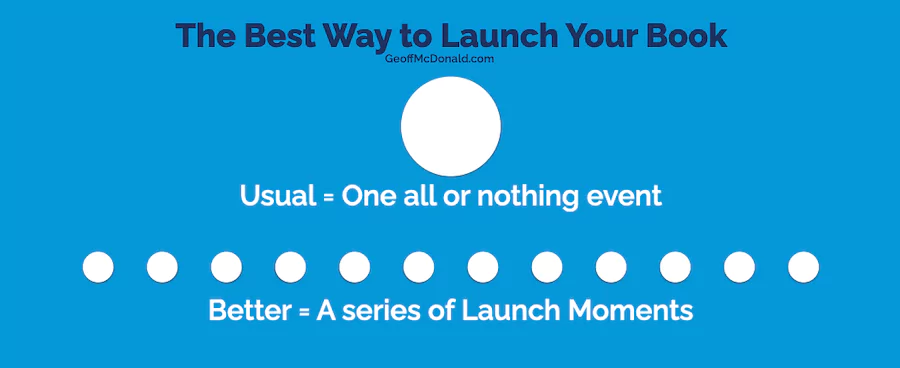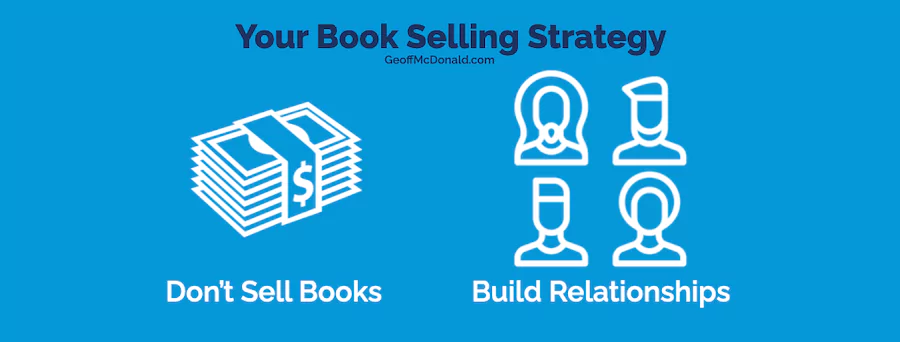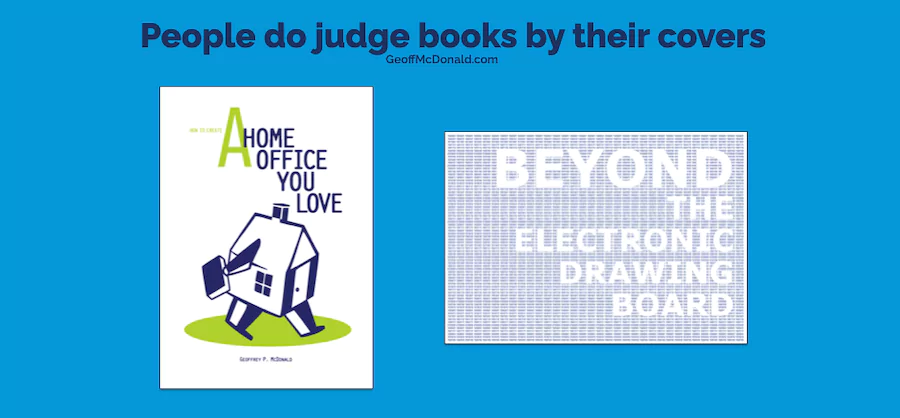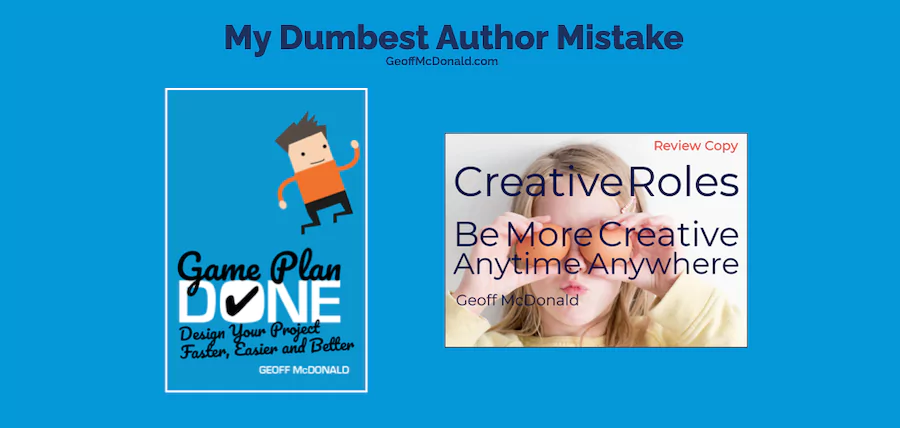Do you want to write a book? Great idea. As someone who’s written and self-published ten books, I can heartily recommend the challenge of writing a book. It might be the biggest and best thing you do in your life.
I view writing a book as a heroic challenge. It’s something that will require you to be at your best for a reasonable length of time to complete.
But as an author of multiple books, I’ve also made lots of mistakes along the way. And in this post, I wanted to share some of those big booboos so you can avoid them, and be more successful sooner.
Here are my top ten book writing mistakes… Please avoid them.
10 How not to launch a book
One of the most exciting things about my first book, A Home Office You Love, was that I’d organised a launch for the Home-Based Business Association in Melbourne. This was my perfect audience, and over 100 people had registered to attend the breakfast where I was the guest speaker.
And I thought, well, I could probably sell 30 to 50 books here, and probably pick up some clients as well. But two days before the launch, Melbourne had a massive rainstorm. And the venue where we were having the breakfast was washed out, and the event was cancelled.
And that made me rethink what a book launch is. Instead of it being one single event, you want to consider it as a series of Launch Moments. For instance, the launch of your book begins when you first announce it to your audience. Then there might be milestones of finishing and releasing individual chapters. Naturally, we have the big moment when you say it’s finished and your release it to the public. And each time you promote it thereafter you might consider it as further little launches. In this way, you can keep launching and re-launching your book for the life of it.
9 Don’t make one-off sales
When I first published my books way back in the early 90s, there was no internet. And when you sold them in bookstores, there was no way that I could find out who bought them. Thankfully, that’s all changed.
Now, particularly if you’re selling directly from your website, you know exactly who’s bought them, and you can start a conversation with them.
The big mistake I made in those early days was firstly not having my contact details in the books.
Second, I had contact details that became out of date. These included street addresses that became obsolete when I moved, a Post-office box that I stopped paying for and websites that I no longer kept current.
To avoid this mistake, you want to make sure you’ve got a permanent location that you can send your readers to. And this might be five years, or 10 years in the future. You don’t know when they’re going to contact you.
My permanent address came when I started using this website, GeoffMcDonald.com as my permanent online home.
Don’t think of your book as a one-off purchase or one-off sale. Instead, think of it in terms of the relationships you can build with people over time. And to make this happen, think about a permanent way that people can stay in touch.
To support me or buy my books on Ko-fi
8 People do judge books by their covers
There’s an old saying that says ‘you shouldn’t judge a book by its cover’. But people do. And rightly so.
My first book, A Home Office You Love was designed by my good friend, Jonathan Hannon. And he’s done a spectacular job, the icon of the house walking with the suitcase was a stroke of genius and unique to this book. It captures the two core elements of this book in a single graphic image.
Best of all, if you looked at this book, you’d probably say, ‘Hey, that’s a good-looking book, I might look inside, I might even buy it’.
For my second book, Beyond the Electronic Drawing Board, I thought I could do better. And looking at the cover, you might say, ‘What a disaster that is’. And it was. I think the concept was fine. But the execution of the design.
When you looked at it, you can barely make out the title of the book. And even that was a big effort. Plus, given this level of effort, you’d probably respond, ‘I’m not interested’. If it was on the shelf in a bookstore, you probably wouldn’t even open it up. And that’s a big failure.
The first job or role of your book cover is to attract attention and provide motivation for the potential buyer to look inside. If they say ‘no’ at this point, then you’re done – no sale.
Further, I was embarrassed by the appearance of this book. And I was embarrassed at such a level that I didn’t even put it in the bookstores. I did try to sell it directly to architects who were the intended audience, but it wasn’t something that I was proud of.
It takes a lot of time and effort to write a book. So don’t waste that last few steps on a poor cover, a poor design, or a poor layout because regardless of what the proverb says, people do judge your books by their covers.
7 Why I write books
For my early books in the 1990s, right through about 2010. I never really understood why I was writing my books.
I used to think it was all about the book and the idea I wanted to share. But then one day, I realized that it was much deeper than this.
Imagine, if you’re a songwriter, and you never recorded your songs or wrote them down. You’d have no record of your work. Likewise, I’m an ideas guy. Unless I document and capture the ideas I’m thinking of and making and creating along the way, I’ve got nothing to show for my thinking and my time and effort.
But worse, I’ve got nothing to show for my life. My books are the embodiment of my life. They’re the souvenir of what I’ve been doing with my time and my hours and my weeks and my months and my years.
A painter can point to their paintings. And for me, I turned to books so I could point to the books as the store of the ideas and the work that I’ve completed. Therefore, I’ve returned to writing books in the last few months. It’s the ultimate self-expression for me and my ideas.
The key point here is if you can get really clear about why you write books, then the process of writing them will be much easier and more inspiring.
Read this post to find your best reason for writing a book
6 Steven Pressfield’s crucial question
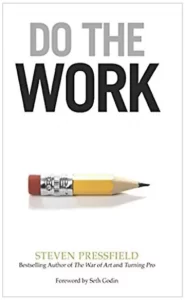
(More great books for writers and authors here)
Now you could leave this to chance. And that’s the mistake that I’ve made. That some days I felt like writing, so I wrote. Some days, I didn’t, so I didn’t. And sometimes that went on for weeks where I just didn’t feel like writing. And my progress stalled and my main momentum stopped.
Pressfield’s message and his answer are very simple: your muse and your inspiration will show up when you show up.
Writing a book will typically take between three, six, and maybe 12 months. And it’s not going to write itself. The key to writing books quickly, easily, and efficiently, is to sit down at your desk every day and do some work. And I mean that literally, writing at the same time every day is an easier habit to maintain than doing it at irregular times during the week. Your brain learns the routine that when you sit down in that same place at the same time, then it’s time to make words happen.
One of the big mistakes I made was not sticking to my routine. If I’d had a regular routine around my writing, instead of 10 books, I’d probably have not even 20, I’d probably have 30 or 40 books written over the last 10 years.
If you want to get your book written, don’t make the same mistake. Build an unbreakable habit for you to get your writing and your book done.
5 Don’t do what Ernest Hemingway did
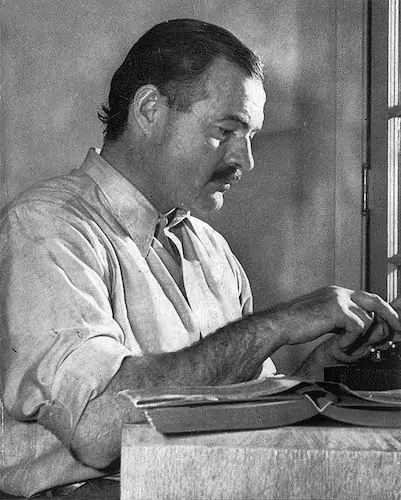
There’s a legendary true story about how Ernest Hemingway wrote his books. He would leave the city and head off to his log cabin in the country, and in total isolation, he would sit down to write his books. And then when he was done, he’d come out the other end, and he’d say, ‘Ta Da’.
Hemingway could get away with this because he was Hemingway. He had a reputation. People were sitting around waiting for his next book. But when I tried that, my audience was equally surprised.
They were surprised that I had a new book because I hadn’t told them that I was writing one and they weren’t waiting for it.
It’s a big mistake to try to sell your hot new book to a cold old audience. Instead, as I said earlier, you want to announce your book, when you start writing it, and keep talking about it all the way through the publication to when it’s available and wherever you’re selling it.
And the best part of this, if you’re engaging your audience, as you’re writing it, I’ll give you some feedback. And that will help you write a better book.
4 What other people will say
Everyone has their opinion, and they’re entitled to speak it. But it doesn’t mean you have to listen.
Between my first three books and my next one was a period of about 15 years. This is a big regret. For me, as I said, writing my books is my self-expression. And during those 15 years, I didn’t write any books.
And the big reason was, that a number of well-intentioned people said, ‘Don’t write books’.
Their reasoning was, ‘You’re better off being seen as a doer than someone who just talks about or writes about it’. Or they said, ‘You’re not ready for your career, you need to be further advanced before you do that’.
That might be good general advice. But for me, in hindsight, that was horrible advice. And I shouldn’t have listened. But at the time, I did.
Take a moment to consider what are the people around you saying to you about whether you should write a book or not. And if you want to write a book then you must decide and commit based on what’s going to work for you. It’s your life, your book.
3 When I bought a new laptop
About 10 years ago, I bought myself a new laptop, and given the new laptop had a hard drive that was smaller than the old one, I had to manually transfer a lot of the files across to the new computer.
Along the way, I found 25 unfinished books. One of those books had over 200 pages of notes. ten of those books were half-written, and the rest had over 10,000 words written as notes.
Now that’s almost a crime against books and a waste of my time, effort, and my life.
While it’s reasonable to presume that I probably didn’t need to finish all 25 of those books, I think you could safely say I probably should have at least finished half of them.
Don’t waste your time, your effort, and your life by leaving things unfinished. Remember, your book is not just about you but it’s also what you could be providing for other people.
2 My Dumbest Mistake
Now, this might be the dumbest mistake on this list of all.
But I’ve written and packaged up two books that I still haven’t published and released to the public. That’s The Done Game Plan and Creative Roles. Now, I don’t really have a good reason as to why I didn’t, I just finished the book and then moved on to other things and didn’t get around to publishing them. I told you it was dumb.
And that’s the ultimate failure of return on investment. I put in all my time and effort, and I got nothing back from it.
That’s dumb, dumb, dumb.
Stay tuned, I am going to address this. But please don’t fall for the same mistake. I urge you. I beg you. Once you commit to your book, finish it. And to help you finish it, build a support team around you to keep you on track and keep you going through the tough times.
To support me or buy my books on Ko-fi
1 The ultimate crime against books

While writing a book, and not publishing is dumb, the ultimate crime against books is not writing your book at all.
Think about that. You know, you want to write a book, and you don’t. That’s the route to regret.
For me, even though I have published ten books, have two waiting to be published and have 25 others half-written, I still have books I desperately want to write that I haven’t even started yet. And when I say ‘desperately’, I measure that against the potential loss I would feel if I were to die and not have these books written and available for others.
Imagine lying on your deathbed, thinking back about the life that you’ve lived. And the things that you wanted to do. Is writing a book going to be one of those regrets for you on your deathbed? There will always be a million and one reasons why you shouldn’t write the book. But at the end of the day, you need to commit, or not commit. Choose.
If it’s something you’re going to do, do it. If it’s not something you’re really committed to cross it off your bucket list and get on with something else.
The worst possible thing you can do is continue to entertain the idea of writing a book without acting. Decide one way or the other so you’ll stop worrying about it.
More Tips on How to Write a Book
If you’re thinking about writing a book, or you currently are writing one, then here are three resources that may be helpful:
- The best reasons to write a book right now
- Book Writing Template – Make Your Book Great in 6 Steps
- 18 different ways to write a book
What would you add to this list? What mistakes have you made writing your books? Or that you’ve seen other people make? And comment below and share your insight.

